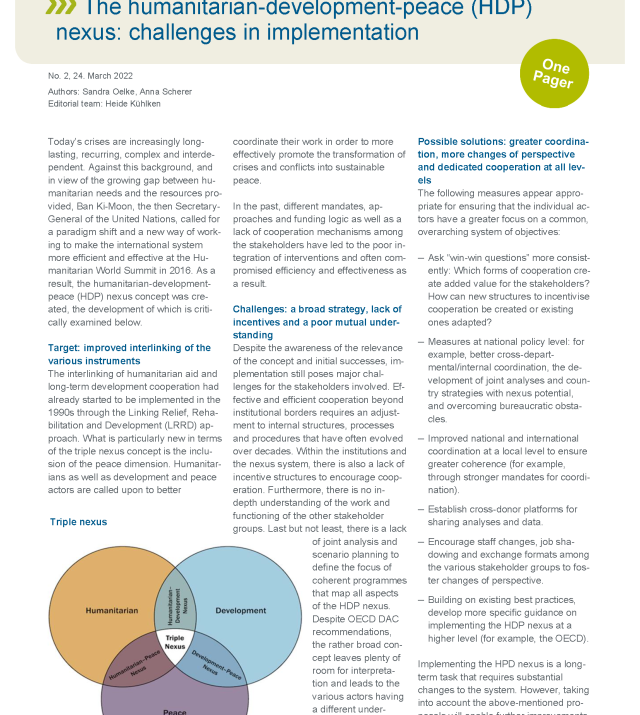
Programming Considerations for Humanitarian-Development-Peace Coherence: A Note for USAID's Implementing Partners

Humanitarian-development-peace (HDP) coherence aims to promote complementary collaboration across humanitarian, development, and peace actors in pursuit of a common agenda. Its goal is to maximize impact and sustainability of programs across different kinds of assistance and to reduce the need for humanitarian assistance (HA) over time.
This document represents USAID's best, most current thinking on the topic of HDP coherence. These programming considerations share both what USAID has learned in its pursuit of HDP coherence as well as promising practices and ideas that USAID has identified through a consultation process with its partners.
In February 2022, the USAID Resilience Leadership Council, in partnership with ResilienceLinks, hosted a learning webinar on the recently released product featuring USAID and global partner representatives.
Learn more about HDP Coherence in the HDP Coherence Collection here.
Additional Resources
- HDP Collection Page
-
This collection of tools, articles, case studies, webinar recordings, and more facilitates the comprehension of HDP coherence in theory and practice. It provides valuable resources that showcase practical examples of how USAID's seven HDP programming principles are operationalized.
- Knowledge Sharing Series on HDP Coherence
-
From June through September 2022, IDEAL convened humanitarian and resilience practitioners for a Knowledge Sharing Series (KSS) on HDP Coherence! This series of online peer-to-peer events explored how to implement more coherent and holistic programming that addresses the increasingly complex crises we face around the world.
- Regional Knowledge Sharing Meeting: Greater Horn of Africa
-
In May 2023, USAID's Bureau for Humanitarian Assistance, Bureau for Resilience and Food Security, Kenya and East Africa Mission, and IGAD, in collaboration with IDEAL and RLA, convened the Greater Horn of Africa Resilience Network's stakeholders for a peer-to-peer Regional Knowledge Sharing Meeting (RKSM) to discuss how to work towards HDP coherence to address the food crisis. The event included six countries: Democratic Republic of Congo, Ethiopia, Kenya, Somalia, South Sudan, and Uganda.

